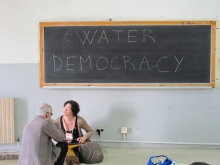Water justice advocates gather in Tunis

The water justice movement continues to try to integrate new issues and tendencies, such as:
- land and water grabbing
- pollution, including by extractive industries (mining, oil, shale gas fracking, etc.)
- water for agriculture (agro-industry versus smallholder farming)
- financialisation of nature, including water
- climate change, green economy
- massive infrastructure, including dams and river linking
- the UN system, the Sustainable Development Goals, etc.
Activists shared examples of challenges, campaigns and victories. The movement in India to resist mega-dams and river linking has used many tactics of non-violent resistance. The current incursion of the privateers in India has prompted new resistance models, including legal challenges, convening tribunals headed by eminent (retired) persons, etc.
A number of recommendations from these meetings:
- Establish a stronger theoretical basis for placing water under the Commons, using experience from the activists as opposed to solely legal and/or academic. The UN Right to Water resolution of July 2010 is not sufficient, is being co-opted by some corporations, and is being undermined by a number of governments (Canada, US, Australia, Japan, etc.). Activists need to adjust to this reality – even while advocating national implementation programmes.
- Assess an appropriate approach to the UN, which is increasingly being captured by corporations. A proposal is floated to create a separate global water authority with enforcement authority, but there is no consensus, and many pitfalls. A related proposal is to look at the UN Committee on Food Security of the FAO as a more participatory mechanism.
- Support strategies to protect water sources such as used by New York (protecting the reservoir area) or Paris (working with farmers to reduce fertilizers and pesticides and encouraging organic farming).
- Seek to establish an international water fund, possibly using crowdfunding (proposal made by the Greek movement which is seeking to raise funds to buy the water utility of Thessaloniki under Troika-imposed privatisation). Find other financing mechanisms as alternatives to private sector.
- Support specific campaigns which have larger implications, such as water in Palestine; Greece and Tunisia privatisation; Chile remunicipalisation (and countering the neoliberal use of Chile as a model for the sector), etc.
- Expanding beyond privatisation to include financialisation (green economy proposals about ecosystem services, etc.). This relates to the UN system and the Sustainable Development Goals which will be heavily influenced by UNEP, promoting ecosystem services approach.
- Expanding beyond supportive public utility operators into the cities and their elected and appointed officials.
Ongoing issues:
- privatisation, including under recent austerity measures
- public-public partnerships as an alternative policy
- re-municipalisation of private concessions.
The work on privatisation is well anchored, but needs constant vigilance in reaching out to new partners, as the dynamics are changing. National austerity programmes in many countries provide the perfect pretext for the privateers, especially as municipal budgets are under increasing pressure. In addition to Suez and Veolia, we are seeing a number of new corporate actors, mainly national and local construction companies, for example in Brazil. Private equity owners are not expanding greatly, but they still need watching. The Chinese company Beijing Enterprises Water Group recently bought Veolia’s Portuguese subsidiary, the first incursion of the Chinese into the global water market. Within PSI, we need to heighten our ability to provide early warning of privatisation policies.
Ridha Fourti from the Tunisian affiliate UGTT representing workers in the public utility SONEDE explained the challenges they face, including attempts by the French to privatise (successfully blocked), and recent proposals to build a desalination plant under public ownership and management - as opposed to giving it over to the privateers from the start. Tunisia suffers from water stress, and even with the most modern management, will soon be unable to provide for all the needs in water.
Fourti also outlined political dynamics in the two years since the revolution, and the challenges that these pose for trade unions and civil society activists. The current government is clearly espousing neoliberal policies. Civil society organisations have suffered under the previous administration, which severely restricted political activity. Trade unions were similarly compromised, although they were able to maintain their existence based on the presence in the workplace. The political party Ennahda is now trying to place its people in all administrative positions that it can occupy, which means that the directors of the public utilities are political appointees. It is even trying to place its people to stand for union elections, forcing the UGTT into defensive postures.
One meeting focused on the collaboration between trade unions and civil society activists. Various experiences, good and bad, were outlined, demonstrating the important differences of national political history and culture. All agreed that the alliance between trade unions and civil society has delivered many important results and is one of the keys to work in the future.

